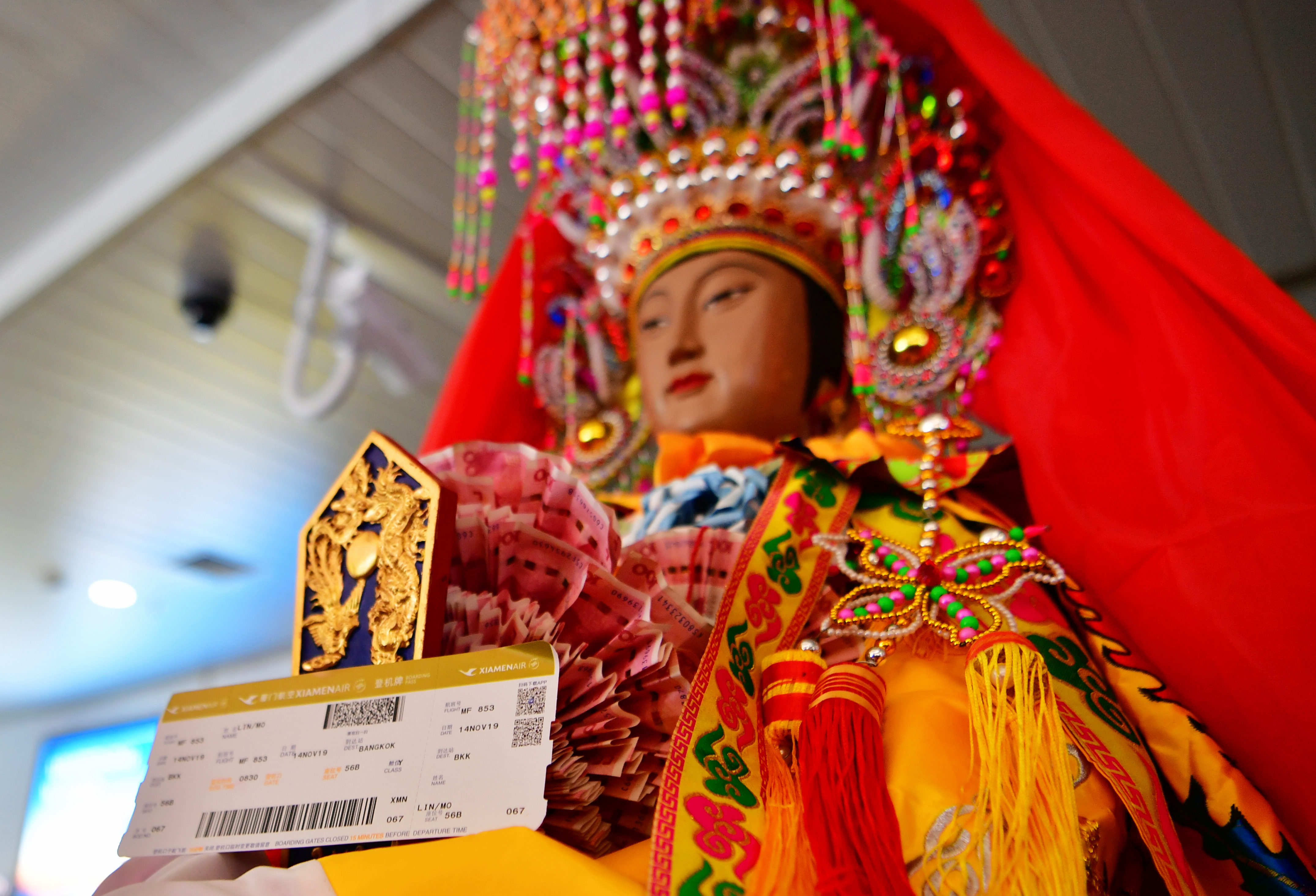"More and more people in Thailand are getting interested in the Mazu culture, and through Mazu, they are gaining a deeper understanding about the Chinese culture," said Vice Chairman of Thailand Quanzhou Jinjiang Union, Wu Hongyan, who escorted the Mazu statue all the way to Bangkok.
by Xinhua writers Zhao Wencai, Zhang Yizhi
BANGKOK, Nov. 18 (Xinhua) -- On Sunday morning, Lin Guiying, a Thai Chinese, got up at six, put on a red shirt, and jumped onto a vehicle bounding for Bangkok more than 90 km away.
"Since I was a child, my mom often told me stories about Mazu," Lin said.
Lin later joined thousands of people dressed in red on streets of the Thai capital. They beat drums and gongs or performed lion dances to welcome and pay tribute to a special visitor -- Mazu, China's most influential sea goddess.
FIRST TRIP TO THAILAND
Amid camera flash light and the gaze by people, a Boeing 787 Dreamliner departed from Xiamen, a coastal city of southeast China's Fujian Province on Thursday morning. Aboard the flight was a special passenger -- a statue of the goddess Mazu, who was on her first trip to Thailand at the invitation of local believers.
This human-sized wooden statue wearing an embroidered rope and a crown decorated with jewels is a Meizhou Mazu, who is from the ancestral temple of Mazu that is located on Meizhou Island of Putian city. Meizhou Mazu is the most worshipped statue among Mazu's followers.

Photo taken on Nov. 14, 2019 shows the statue of the Chinese sea goddess Mazu and the boarding pass of an airplane which will take her to Thailand from Xiamen, southeast China's Fujian Province. (Xinhua/Wei Peiquan)
During her Nov. 14-19 stay in Thailand, Mazu is scheduled to attend a sequence of cultural exchange activities while visiting local communities.
"More and more people in Thailand are getting interested in the Mazu culture, and through Mazu, they are gaining a deeper understanding about the Chinese culture," said Vice Chairman of Thailand Quanzhou Jinjiang Union, Wu Hongyan, who escorted the Mazu statue all the way to Bangkok.
Noting that Mazu enjoys a widespread popularity in Thailand, Arrun Boonchai, assistant permanent secretary at the Ministry of Tourism and Sports, said at the welcome ceremony that he really appreciates that he can see Mazu in Thailand, and that he hopes activities like this would increase the communication between the Thai and Chinese cultures.
ALSO A HUMAN
Ferried across the sea, taking bus on the land, and flying economy class -- the complex journey of the widely-worshipped goddess to Thailand is not so otherworldly as many people might think, a reminder that Mazu was once an ordinary human.
Mazu is a deified young woman named Lin Mo who is believed to have lived in the 10th century on Meizhou Island, where she dedicated herself to helping people in need and died attempting to rescue shipwreck victims at the age of 27.
Local people then regarded her as the goddess of the sea who could bring peace, fortune and good luck. When sailing out, sailors and fishermen would venerate her statue and pray for her help so that they would return home safely, and with a big catch.

A statue of the Chinese sea goddess Mazu departs her temple in Meizhou Island of Putian, southeast China's Fujian Province, on Nov. 13, 2019. (Xinhua/Wei Peiquan)
Stories about Mazu bringing safety, harmony and prosperity to people were told in more than 1,000 years among her followers. "Mazu is a goddess, and is also a human," said Zhou Jinyan, deputy secretary general of the Chinese Mazu Cultural Exchange Association. "We take Mazu as a member of our family."
According to Zhou, among her followers, Mazu is a source of their courage to overcome hardships during sea voyages, and she signifies a spirit of integrity, benevolence and love.
TO BEYOND CHINA
As trade flourished in the ports along the ancient Maritime Silk Road, more and more Chinese people ventured out to the sea, bringing silks, china, tea, as well as the Mazu belief to lands beyond China.
Currently, the Chinese sea goddess Mazu is believed to have more than 300 million followers in about 46 countries and regions around the world. In 2009, the Mazu belief and customs were inscribed on the UNESCO Representative List of the Intangible Cultural Heritage of Humanity.
In 2013, China proposed the initiative of building the 21st Century Maritime Silk Road.

People take part in a ceremony to pay tribute to Chinese sea goddess Mazu in Bangkok, Thailand, on Nov. 15, 2019. (Xinhua/Wei Peiquan)
Mazu plays "the role of a cultural bond" in connecting the peoples of China and Southeast Asian countries along the Maritime Silk Road, said Zhou.
To carry forward and further spread Mazu's spirit, since 2017, the Meizhou Mazu Ancestral Temple has initiated a cultural exchange campaign by arranging foreign trips for Mazu to countries along the maritime silk road.
Zhou said, "Mazu's followers include people of different colors and with different religious backgrounds," adding, "Mazu gained their faith for her inclusiveness and advocating peace."
Previously, Mazu visited Singapore and Malaysia in 2017, and the Philippines in 2018.
(Xinhua reporters Wei Peiquan from Fu Jian, Wang Jin from Bangkok also contributed to the story.)
(Video reporters: Zhang Boning, Wei Peiquan, Zhao Wencai and Guo Qi; Video editor: Jia Xiaotong)



